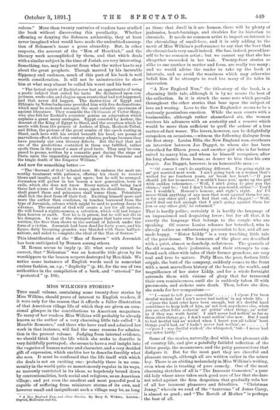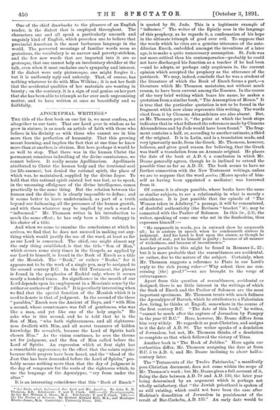MISS WILKINS'S STORIES.* THIS small volume, containing some twenty-four stories
by Miss Wilkins, should prove of interest to English readers, if it were only for the reason that it affords a fuller illustration of that American village life of which they are given an occa- sional glimpse in the contributions to American magazines. To many of her readers. Miss Wilkins will probably be already known as the author of a very charming little tale called "A Humble Romance," and those who have read and admired her work in that instance, will find the same reasons for admira- tion in the present volume. Judging from internal evidence, we should think that the life which she seeks to describe is very faithfully portrayed ; she seems to have a real insight into the vagaries of human nature and character, and a very decided gift of expression, which enables her to describe forcibly what she sees. It mast be confessed that the life itself with which she deals is not an exciting one : probably there is no com- munity in the world quite so monotonously regular in its ways, so narrowly restricted in its ideas, so hopelessly bound down by conventionalities, both social and religious, as an American village ; and yet even the smallest and most peaceful pool is capable of suffering from miniature storms of its own, and however small and insignificant such a village may be, as long
* A New England Nun, and other Stories. By Mary E. Wilkins. London : Osgood, Mellvaine and Co.
as those that dwell in it are human, there will be plenty of jealousies, heart-burnings, and rivalries for its historian to chronicle. It needs no common artist to impart an interest to the chronicling of small-beer, and it is only adding to the merit of Miss Wilkins's performance to say that the beer that she chronicles is very small indeed. She has, indeed, proved her- self to be no common artist ; but we cannot say that she has altogether succeeded in her task. Twenty-four stories so alike to one another in matter and form, are really too many ; and we would advise the reader to take up the book at intervals, and so avoid the weariness which may otherwise befall him if he attempts to read too many of its tales in succession.
"A New England Nun," the title-story of the book, is a charming little tale, although it is by no means the best of the collection. In it is struck the same note which prevails throughout the other stories that bear upon the subject of love and wooing. Love to the New Englander seems to be a curiously passionless emotion. While the man courts with a businesslike, although rather shamefaced air, the woman receives his advances with an austerity and a reserve which would be more than sufficient to quell the ardour of a less matter-of-fact wooer. The lovers, however, can be delightfully outspoken on occasions,—witness the following dialogue from the first story. Louisa Ellis, the New England nun, overhears an interview between Joe Dagget, to whom she has been betrothed for fifteen years, and another girl who is far better suited to marry him, and whom he himself recognises, after his long absence from home, as dearer to him than his own
fiancee. Joe Dagget, however, is an honourable man :— " Of course I can't do anything different. I'm going right on an' get married next week. I ain't going back on a woman that's waited for me fourteen years, an' break her heart.'—' If you should jilt her to-morrow, I wouldn't have you,' spoke up the girl with sudden vehemence.—' Well, I ain't going to give you the chance,' said he ; 'but I don't believe you would, either.'—' You'd see I wouldn't. Honour's honour, and right's right. An' I'd never think anything of any man that went against them for me, or for any other girl ; you'd find that out, Joe Dagget.'—' Well, you'll find out fast enough that I ain't going against them for you or any other girl,' he returned."
That is hardly polite ; certainly it is hardly the language of an impassioned and despairing lover ; but for all that, it is exactly the language that belongs to the couple who are speaking. Of course Louisa releases her betrothed, who is already rather an embarrassing possession to her, and all are
made happy. "Sister Liddy" is a very touching little tale of the poor-house. The humours of the place are described with a quiet, almost melancholy, sedateness. The quarrels of the old women, their jealousies, and their attempts to con- found each other with tales of their former grandeur, are very real and true to nature. Polly Moss, the poor, forlorn little cripple, the butt of the company, suddenly comes to the front with a most marvellous history of the beauty, the wealth, and magnificence of her sister Liddy, and for a whole fortnight astounds them with visions of glory that far transcend their own reminiscences, until she is suddenly taken ill with pneumonia, and sickens unto death. Then, before she dies, she sends for her companions :—
1—want to tell you—somethin' I s'pose I've been
dretful wicked, but I ain't never had nothin' in my whole life. 1 —s'pose the Lord orter have been enough, but it's dretful hard sometimes to keep holt of him, an' not look anywheres else, when you see other folks a-clawin' an' gettin' other things, an' actin' as if they was wuth havin'. I ain't never had nothin' as fur as them other things go ; I don't want nothin' else now. But I used to feel dretful bad an' wicked when I heerd you all talkin"bout things you'd had, an' I hadn't never had nothin', so —s'pose I—was dretful wicked,' she whispered, but—I never had any sister Liddy.'"
Some of the stories, naturally, deal with a less pleasant side of country life, and give a painfully faithful reflection of the bitter gossip, the meat:messes, and the petty persecutions that disfigure it. But for the most part they are cheerful and pleasant enough, although all are written rather in the minor key. There is an abiding melancholy in Miss Wilkins's writing, even when she is treating of pure comedy. One of the most charming sketches of all is "The Innocent Gamester," a poor old lady whose niece takes such good care of her that she dare not rebel against the firm despotism that gradually robs her of all her innocent pleasures and frivolities. "Christmas Jenny," wherein we read of the " tantrums " of Jonas Carey, is almost as good ; and "The Revolt of Mother" is perhaps. thebest of all. One of the chief drawbacks to the pleasure of an English reader, is the dialect that is employed throughout. The characters one and all speak a particularly uncouth and ungainly kind of English, which provokes one to believe that provincial American is the most barbarous language in the world. The perverted meanings of familiar words seem so gratuitous, the vocabulary is so narrow and poverty-stricken, and the few new words that are imported into it are so grotesque, that one cannot help an involuntary shudder at the talk, even when it most enchains one's sympathy and interest. If the dialect were only picturesque, one might forgive it ; but it is uniformly ugly and unlovely. That, of course, has nothing whatever to do with Miss Wilkins ; it is not her fault that the accidental qualities of her materials are wanting in beauty ; on the contrary, it is a sign of real genius on her part that she has been able to triumph so far over such unpromising matter, and to have written at once so beautifully and so faithfully.



































 Previous page
Previous page